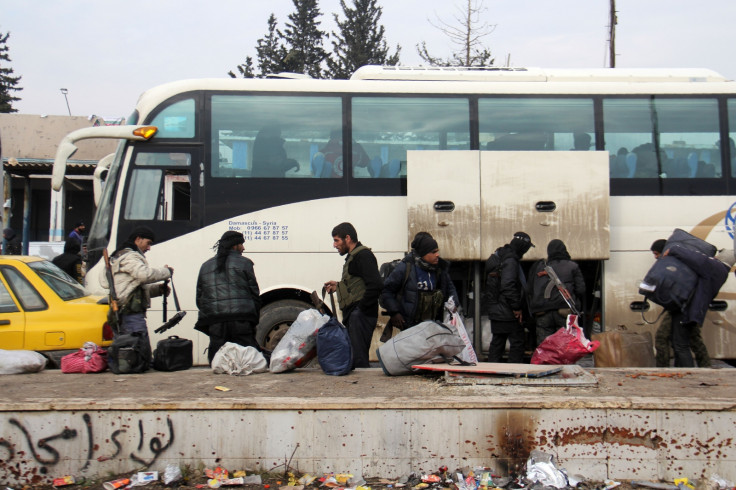Syrian refugees are looking to the future this Christmas – their bravery should inspire us
While 2016 has been dominated by negative stories and divisive rhetoric, there are reasons to have hope.

This Christmas you'll likely be inundated by appeal letters. It's true, 2016 has been particularly tough in so many ways and there's almost unprecedented humanitarian need in so many places. Syria is facing its sixth year of unthinkable horror, and there are less widely reported pockets of catastrophe unfolding in Nigeria, South Sudan and Yemen, as well as violence affecting us even closer to home.
With scenes of turmoil and human suffering, compounded by rising anti-immigrant rhetoric and calls from some segments of the media and political parties to pull up the drawbridge, it's understandable that there is a tendency to focus on the negatives. But, privileged as I am to work for the global organisation Mercy Corps, I feel especially fortunate to have seen another side of the news this year.
There is no denying that the images of indescribable suffering in Aleppo – a Srebrenica never again – may have left many feeling despair and unable to help – but even in the most impossible of circumstances we can find stories to inspire us.
Right now, I am receiving regular reports from individuals working on the ground receiving evacuees from Aleppo. In temperatures hovering around freezing, brave Syrians are meeting their compatriots with dignity, support, food and shelter. One of our team members there said about the mood at the welcome centres: "there were volunteers, private associations, waiting for them, even people who are not humanitarian workers are doing their best."
Since Thursday, our organisation has welcomed more than 5,000 men, women and children from Aleppo city, arriving with very few belongings, after hours or even days of waiting in the cold. The teams are working constantly, with very little rest, trying to find new ways to help. "We'll feel tired after everything is completed. They are expecting a lot from us; we must do more," a team member said.
While millions have fled the horrors of Syria and sought safety and a better life in neighbouring countries and beyond, including in Europe, we have frequently been told this year to mistrust those who are different from us. Having visited our humanitarian work in Turkey, Jordan, Lebanon and Greece over the course of this year, this scaremongering and polarising rhetoric has concerned me greatly.
While the movement to Europe has certainly been unprecedented in recent years, only 1.2 million of the estimated 21.3 million refugees around the world are actually in Europe. The Middle East and North Africa host almost 40 per cent of all refugees, with the country of Jordan playing a substantial role.
Earlier this year I had chance to visit Jordan's largest refugee camp, Zaatari, where I witnessed the courageous efforts of teachers and community members bringing groups together and empowering vulnerable young people to give them hope for the future.

Take a moment to imagine the strength of character it takes to maintain a positive outlook if you're only 12-years-old and have spent five of those years in a refugee camp. Azeh, an inspiring young girl from Daraa in Syria, attends our youth centre in Zaatari camp after school three days a week. "First I go home to wash and eat and then I come to the centre" she tells us while explaining how she learned to switch on a computer for the first time, "maybe I'll become someone who can teach computers."
Azeh attends sessions that provide life skills and the centre gives her a safe place to play. She has a tender relationship with her teacher Khawla who herself is Syrian and has been one of our life skills facilitators in Zaatari for four years. Khawla used to be a primary school teacher, but left Syria with her seven children because she was afraid to lose them. She is unsure whether she can ever go back but now spends her days rebuilding the hopes and dreams of others.
It's up to all of us to stand up and say that we are better than the protectionist and isolationist policies that seek to increase disparities and tensions between us
So, let's end this year by honouring the work done by these extraordinary humans around the world and the bravery of young people in the face of such adversity. The more we hear about how these courageous individuals live life day to day trying to bring communities together in tough environments, this can only leave us feeling awed and positive – and give us cause for hope in the year ahead.
It's up to all of us, this Christmas season, but most importantly in 2017 and beyond to stand up and say that we are better than the protectionist and isolationist policies that seek to increase disparities and tensions between us, and instead show greater empathy and solidarity – and demand this of our leaders.
Winter, of course, heralds the spring and as we look forward to an unwritten year ahead, let's remember our values and redouble our resolve. That's my appeal this Christmas.
Simon O'Connell is executive director of the Mercy Corps.
© Copyright IBTimes 2025. All rights reserved.






















